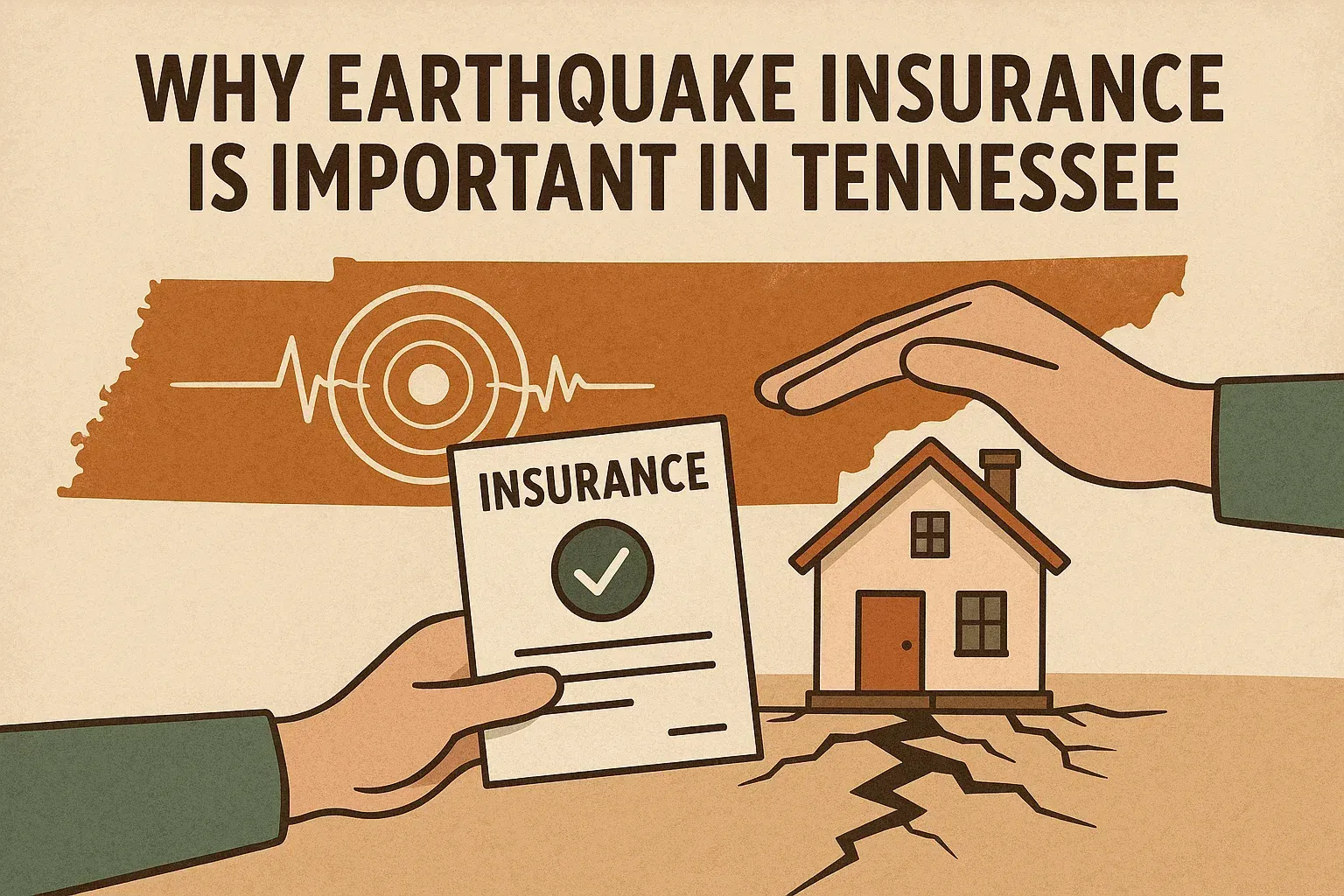lance • July 18, 2025
Why Earthquake Coverage Is More Important in Tennessee Than You Think
Earthquakes in Tennessee!?

When you think of earthquakes, your mind probably jumps to California or Alaska—places with frequent seismic activity and major fault lines. But what if we told you that Tennessee, right here in the heart of the South, is actually one of the most earthquake-prone states in the U.S.?
It’s true—and yet, most homeowners in Tennessee are dangerously underprepared when it comes to earthquake insurance. While standard homeowners insurance policies typically cover fire, wind, hail, and theft, they almost never cover earthquake damage. That leaves a significant gap in protection
for thousands of Tennesseans.
Let’s take a deeper look at why earthquake coverage is so important for Tennessee residents, especially if you own a home or rental property.
The Quiet But Serious Threat: Earthquakes in Tennessee
You might be surprised to learn that Tennessee sits along one of the most dangerous seismic zones in the eastern United States—the New Madrid Seismic Zone
(NMSZ). This fault line stretches across southeastern Missouri, northeastern Arkansas, western Tennessee, western Kentucky, and southern Illinois.
While it doesn’t make headlines often, the NMSZ has a frightening history. In the winter of 1811–1812, a series of powerful quakes shook the region, including three estimated to be above magnitude 7.0. These quakes caused the Mississippi River to briefly flow backward and reshaped the land in dramatic ways. Scientists agree that it’s not a matter of if another major earthquake will occur—it’s when.
In fact, the U.S. Geological Survey estimates there’s a 7–10% chance of a magnitude 7.0 or greater quake occurring in the New Madrid zone within the next 50 years—and a 25–40% chance of a smaller, yet still damaging, magnitude 6.0 event.
That puts much of West and Middle Tennessee—including Memphis, Jackson, and even parts of Nashville—at real risk.
Why Most Tennesseans Are Uninsured Against Earthquakes
Despite this risk, the vast majority of homeowners in Tennessee do not carry earthquake insurance. Why?
There are a few reasons:
1. Lack of Awareness: Many people don’t realize Tennessee is at risk.
2. False Sense of Security: Since major earthquakes are rare, people think it “won’t happen to me.”
3. Cost Concerns: Earthquake insurance is often seen as optional or too expensive.
4. Misunderstanding Coverage: Many believe their homeowners policy includes earthquake protection—when it does not.
This combination of factors has led to dangerously low coverage rates in a state with real seismic risk.
The Financial Devastation of an Uninsured Earthquake
The average homeowners policy excludes “earth movement,” meaning any damage from an earthquake—whether it’s cracked foundations, collapsed walls, or broken pipes—is not covered unless you have a separate earthquake endorsement or policy.
Consider this:
if a moderate quake causes $100,000 in structural damage to your home and you don’t have coverage, you could be left paying that entire cost out-of-pocket.
Now imagine a more severe event. In a worst-case scenario, your home might be uninhabitable.
You might face not only repair costs, but also:
• Temporary housing expenses
• Loss of personal property
• Mortgage payments on a damaged or destroyed home
• Structural upgrades required by new building codes
Without earthquake insurance, none
of these would be reimbursed.
Earthquake Coverage: What It Typically Includes
Earthquake insurance is either offered as a standalone policy or an endorsement (add-on) to your existing homeowners insurance.
While coverage can vary, a standard earthquake policy generally includes:
• Dwelling Coverage: Pays to repair or rebuild your home.
• Personal Property: Covers damaged belongings like furniture, electronics, and appliances.
• Loss of Use (Additional Living Expenses): Covers hotel stays, meals, and temporary housing if your home is uninhabitable.
• Other Structures: May include coverage for garages, sheds, or fences.
It’s important to review the deductible carefully—most earthquake policies have a percentage-based deductible (commonly 10–20% of your home’s insured value), not a flat amount like traditional homeowners coverage.
For example, if your home is insured for $250,000 and you have a 10% deductible, you’d be responsible for the first $25,000 in repairs. While that may seem steep, it’s a fraction of what you’d pay without any coverage.
Why Tennessee Residents Should Act Now
The unfortunate truth is that once an earthquake occurs, it's too late to buy coverage. Insurance companies won’t sell new policies in the immediate aftermath of a quake—or they may impose waiting periods.
Given the unpredictability of seismic events and the high potential for loss, securing earthquake coverage before disaster strikes is crucial.
And remember:
even minor quakes can cause damage. Brick homes, older homes, and homes not built to modern seismic standards are especially vulnerable. Tennessee’s varied housing stock includes many such structures.
Tennessee-Specific Considerations
In addition to the New Madrid zone, parts of East Tennessee sit near the East Tennessee Seismic Zone (ETSZ)—another area of seismic concern. While less active than the New Madrid zone, it still produces regular small quakes and holds potential for larger events.
Cities like Chattanooga, Knoxville, and surrounding areas may feel effects from this zone, making earthquake coverage a smart investment across the state—not just in the west.
Also, Tennessee's geology—especially in the Mississippi embayment—can amplify shaking from distant quakes, increasing the potential for damage even far from the epicenter.
Earthquake Coverage Is More Affordable Than You Think
Many homeowners skip earthquake insurance assuming it’s too expensive. The truth? In Tennessee, policies are often surprisingly affordable, especially when compared to the potential cost of rebuilding a home or replacing all your belongings.
Premiums vary based on:
• Home location
• Building materials (brick homes tend to cost more to insure)
• Year built
• Foundation type
• Policy limits and deductible
An independent insurance agent can help you shop multiple carriers to find a policy that fits your needs and budget.
Final Thoughts: Peace of Mind Is Priceless
Earthquakes don’t give you a warning. When the shaking starts, it’s too late to ask “am I covered?”
For Tennessee residents, earthquake insurance isn’t just a luxury—it’s a smart, forward-thinking investment in your financial security. With scientific consensus pointing to future seismic activity in our region, protecting your home and assets is more important than ever.
Whether you live in Memphis, Nashville, Jackson, or Knoxville, we strongly encourage you to review your current homeowners policy and talk to a licensed insurance professional about adding earthquake protection.
At 615 Insurance, we’re here to help you assess your risk, explain your options, and find coverage that gives you peace of mind—no matter what comes your way.
Need Help Navigating Earthquake Insurance?
Our team at 615 Insurance is ready to help. Give us a call at 615-809-1225, email us at Lance@615insured.com, or stop by our office for a personalized consultation. We’ll walk you through the process and make sure you’re protected from the unexpected.
Don’t wait for the ground to shake.
Get the protection you need today.

